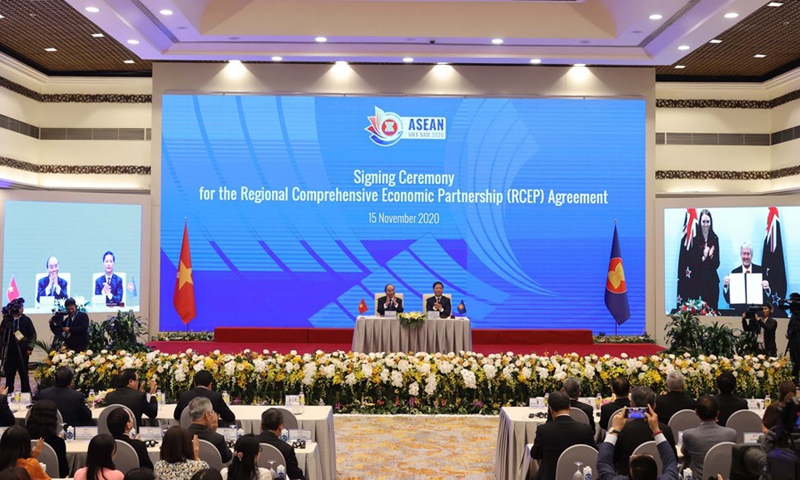RCEP boosts China’s new round of opening up: Ministry of Commerce
By Tao Mingyang Source: Global Times Published: 2020/11/16 14:53:40

The signing ceremony of the Regional Comprehensive Economic Partnership (RCEP) agreement is held via video conference in Hanoi, capital of Vietnam, November 15, 2020. Photo: Xinhua
The signing of The Regional Comprehensive Economic Partnership (RCEP) is a great step towards the implementation of China's free-trade-zone strategy, China's Ministry of Commerce has said.
The establishment of the largest free trade zone worldwide by RCEP will provide a huge boost to the construction of a new and open economic system. It can also create a new pattern of development in which both domestic and international economic cycles play vital roles and help to promote each other.
RCEP will become China's most important platform for continuing the new era of opening up. The trade volume between China and other RCEP member countries accounts for one third of global trade. Meanwhile, investment from RCEP countries makes up 10 percent of all overseas investment on this planet.
The comprehensive regional market set up by RCEP will unleash great potential and promote intraregional trade and investment. It will help China to make a deeper, more comprehensive and diverse opening-up strategy.
Overseas trade and investment plans will be optimized accordingly, to reach the stricter international trade regulations and build a high-level system for a regional open economy covering 15 countries and 2.2 billion people in Asia-Pacific.
RCEP will facilitate China to form the new domestic and international "dual-circulation" development pattern, too. It will promote China's various industries to participate in market competition and enhance the ability to allocate resources in both international and domestic markets.
The RCEP platform helps to push forward China's opening up strategy and drive domestic innovation, promote reform and development, and will help realize industrial transformation and upgrading.
China's role in intraregional industrial production and its supply chain will be cemented, which will support the circulation of the domestic economy, help China gain a new competitiveness in international cooperation, and boost the development of the Chinese economy.
The establishment of RCEP will also increase the value of China's free trade zone network. The implementation of a free trade zone strategy is an important part of China's new round of opening-up. After the signing of RCEP, the number of China's international free trade agreements stands at 19, with 26 free trade partners in total.
China has made a free trade agreement with Japan through RCEP, which is the first time that China has signed a free trade agreement with a top-ten-economy in the world. This is a breakthrough for China's free trade zone strategy.